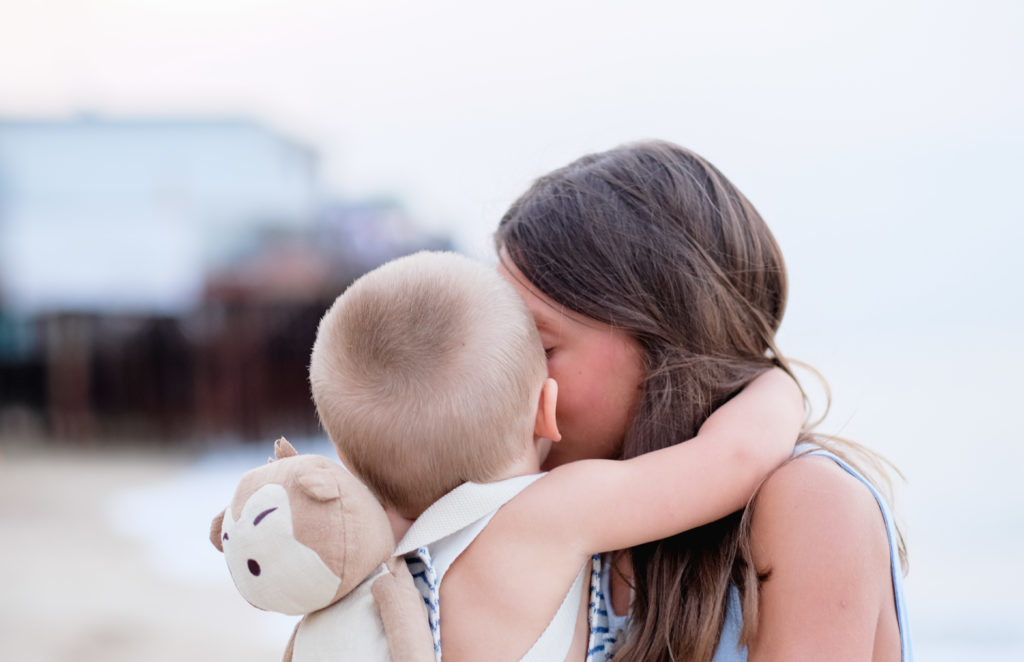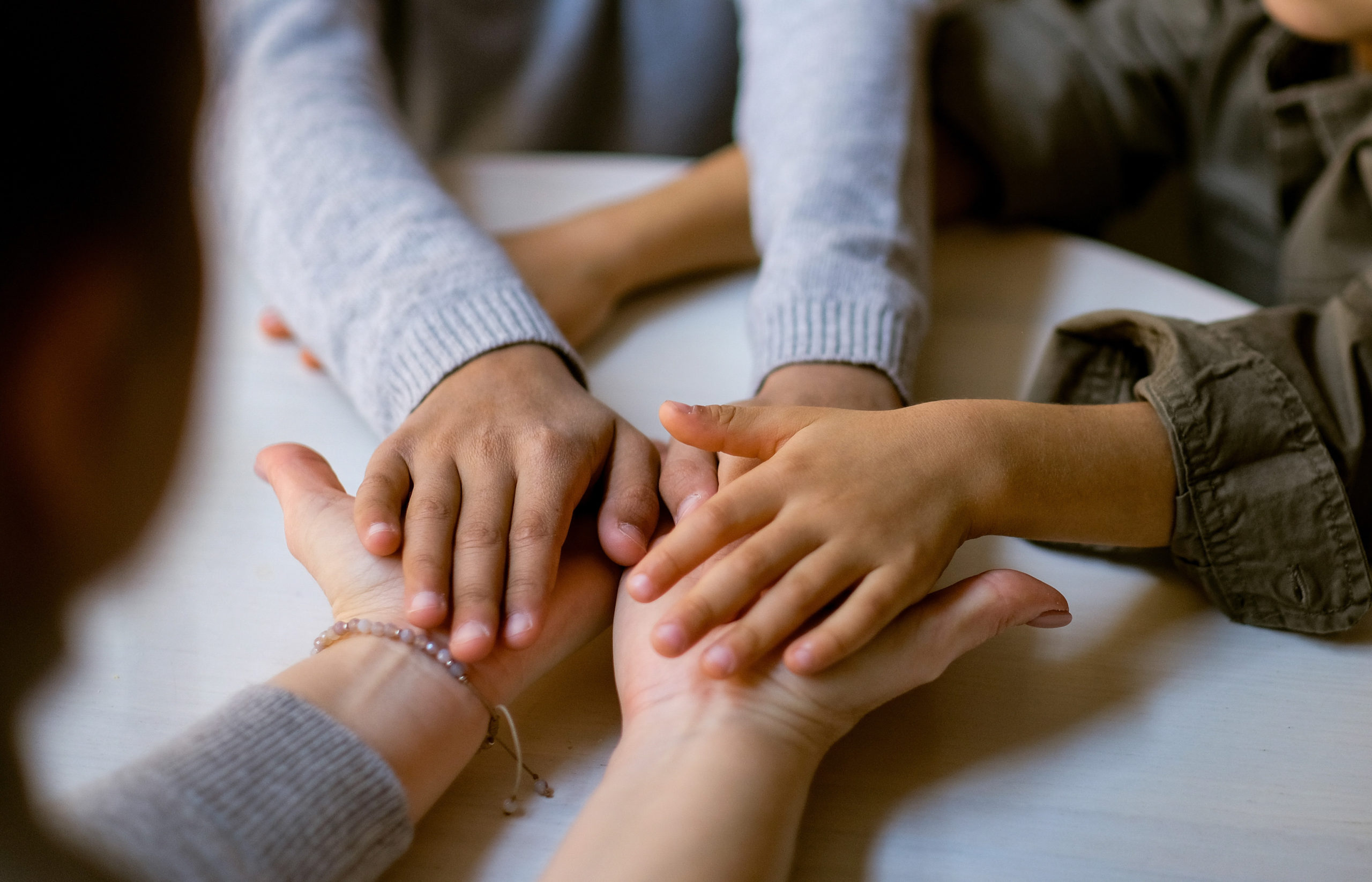1. Yes to news, but in moderation
The need to stay informed is normal. However, try not to follow the news 24/7; the constant influx of negative updates can worsen your anxiety. Children should not be subjected to that either. If they do not have first-hand experience with the war and have so far been successfully protected from the depictions of the violence, the media portrayal could pose a threat to their mental well-being. Media theorists even warn that the media’s long-term emphasis on violence contributes to the so-called mean world syndrome – perceiving the world as a more dangerous and worse place than it actually is. So, you should only watch the news once in a while and for a limited period of time, for example, during evenings, when your children are asleep.
2. Discuss the war with children, but in a sensitive manner
Do not pretend that there is nothing going on and that no war is happening. Instead, speak with your children openly, but always take into consideration their age and their mental state. You can, for example, compare the conflict to what happens in fairy tales, where we also see good fighting evil, and which display villains alongside heroes. If you hide the truth from your children, you can be sure that they will learn it elsewhere – it could be from random people, other children, or teachers. Not every educator is also a good psychologist, diplomat or a therapist and it is possible that they will convey information with less sensitivity than you would. You do not need to delve into details and present children with a map of the invasion or with strategic points which are currently under offensive. It is sufficient to explain the situation in a general and easy-to-understand way.

3. Establish a schedule. For your children and for yourself
The war tends to be the main topic among relatives and friends who are all experiencing a similar situation. Try to separate the children, at least partially, from these discussions and give them the opportunity to spend time in a different group, ideally one which consists of children of the same age. In a new environment, it is key to find some order and structure as quickly as possible. So, try to keep yourself and your children occupied; be it with work, a game, learning or any other activity which you know has always brought you joy. This way, you will occupy your mind with different thoughts. Simply try to avoid any idle time and, in the best-case scenario, come up with a plan for every single day. Knowing what will be happening and what kind of schedule to expect is helpful for both children and adults.
4. Let the children “draw themselves out of it”
Tanks, missiles, destroyed buildings, people running for their lives. Perhaps even blood and victims. If the drawings of your child include similar themes, there is no need to be frightened. On the contrary – this is a proven therapeutic method and a great way of releasing negative emotions. So, when they bring you a war-themed drawing again, do not lament it. At that moment, such art was much more of help to them than drawing flowers and butterflies in the sun.
5. What you sense is what your child senses
Children may often appear not to be listening, but they are paying close attention to the flow of information, expressions, and emotions, which directly affects the way they feel. Keep this in mind whenever you speak about the war and other circumstances in their presence. It is understandable that sometimes you cannot help feeling anxious or crying when you are with them. If you are unable to control expressing your emotions, explain to your children that crying helps to calm your worried mind. Just like medicine relieves their illness, crying relieves your pain. The tears are your helpers, and with them, all negativity flows away. At the same time, it is important for your child to know that nothing has happened to you at that very moment and that your crying is not an immediate reaction.
First aid for an aching soul? Socialising
If you notice your child might not be coping well with the current situation, the first step you should take is to get them to socialise. Children play under all and any circumstances, and it is an important emotional outlet for them, which is best utilised in a group of children. You can also keep a journal for both yourself and your child.
Create an anxiety levels scale – a vertical axis (or line), its centre marked with the number 0. Add a timeline – a horizontal axis, 0 being the origin of the axes, where the two lines intersect. Then, record the levels of your anxiety, as well as your child’s, in regular intervals: record a positive value by marking a point above the 0 when you’re feeling good, and record a negative value when you are feeling down. Feel free to do this multiple times a day.
Furthermore, try to take note of what caused or triggered any significantly low points. They can be related to specific fearful thoughts and notions, but also depend on a particular situational context or events which took place on the given day (watching the news, conversations with close people regarding the state of war, having too much unstructured time, and so on). This is an easy way to identify what most commonly triggers your anxiety, which allows you to make changes and reduce the impact it has on your general mental well-being.
Keep in mind that anxiety is contagious and that we often tend to judge our past based on the way we are feeling at the moment. When you are feeling down, you might be under the impression that you always feel this way and always have. The anxiety levels scale can also come in handy then, and remind you that your anxiety is not never-ending, that the way you feel changes and that there are good days, too. It’s just that you forgot about them.
Do you find your daily records staying in the negative values for more than 14 days? This can be an indication that you or your child needs to seek therapeutic intervention. You can reach out to numerous organisations, which offer free of charge psychological aid.
6. Stay in touch
If possible, reach out regularly to those of your family and friends who have remained in Ukraine. Knowing that grandma is all right, that she knows where to hide when necessary, and that daddy is defending your home while thinking of you day-by-day is helpful for your children as much as it is for you.
7. Do not deny yourself happiness
You have the right to feel joy. Because of your children’s progress, their laughter or even just because of an incredibly good cup of coffee, which you get to enjoy in the city centre together with your friend. Do not feel guilty for feeling content and happy; your sorrow will help nothing and no one. On the contrary, remember how your children, your parents or your partner love seeing you happy. They certainly would not wish for you to be miserable. If you cannot let go of the dark feelings and they keep dragging you down, do not be afraid to seek professional help and maybe even take antidepressants temporarily. Do not see medication as your own failure – it may help you overcome the biggest crisis.
These tips were written up in consultation with therapists and special educators from the National Institute for Autism (NAUTIS). We would like to extend our thanks for the collaboration to Mgr. Lenka Bittmanová, Mgr. et. Bc. Julius Bittman, and PaedDr. Věra Čadilová. Their work focuses mainly on people with autism spectrum disorder, but also their families and near and dear ones.

